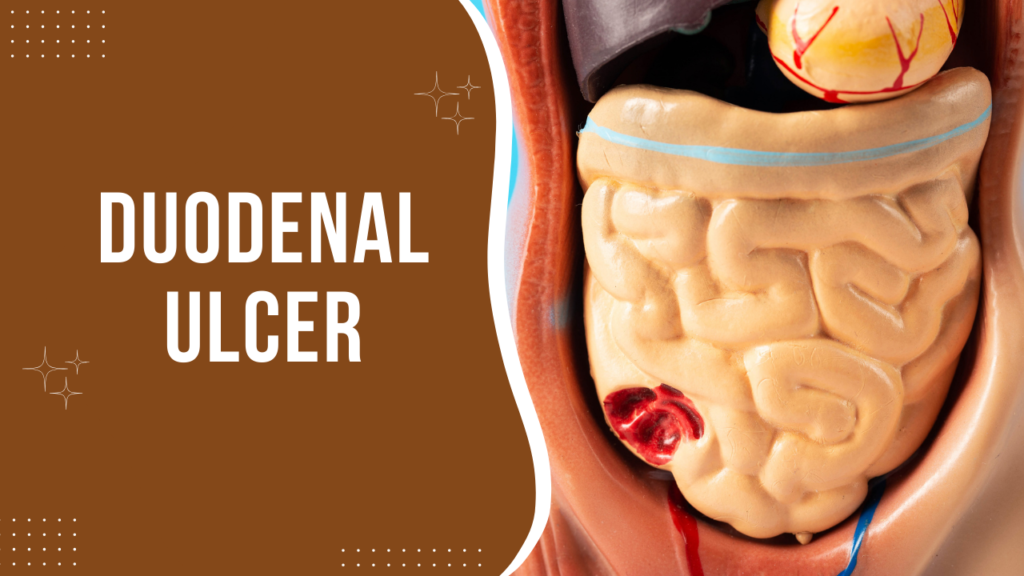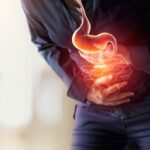A duodenal ulcer is a type of peptic ulcer that forms in the first part of the small intestine (duodenum). It occurs when the protective lining of the duodenum is damaged, allowing stomach acid to erode the tissue. This condition is a common gastrointestinal disorder, often linked to bacterial infections, medication use, and lifestyle factors. If left untreated, it can lead to severe complications such as bleeding, perforation, and obstruction.

Causes of Duodenal Ulcers
Several factors contribute to the development of duodenal ulcers, primarily an imbalance between aggressive stomach acids and the duodenal mucosal defense mechanisms.
1. Helicobacter pylori (H. pylori) Infection
- The most common cause of duodenal ulcers.
- This bacterium weakens the protective mucous lining, allowing stomach acid to damage the duodenum.
- Chronic infection can lead to inflammation, increased acid secretion, and ulcer formation.
2. Nonsteroidal Anti-Inflammatory Drugs (NSAIDs)
- Long-term use of NSAIDs like aspirin, ibuprofen, and naproxen can irritate the stomach lining.
- These drugs reduce the production of protective prostaglandins, making the duodenum more susceptible to acid damage.
3. Excess Gastric Acid Production
- Conditions like Zollinger-Ellison syndrome cause excessive acid secretion, increasing the risk of ulcers.
- Stress and certain foods may also contribute to higher acid levels.
4. Lifestyle and Dietary Factors
- Smoking weakens the duodenal mucosa, impairing its ability to heal.
- Excessive alcohol intake increases stomach acid production and damages the lining.
- Spicy foods and caffeine can aggravate symptoms but are not direct causes.
Symptoms of Duodenal Ulcers
Symptoms vary in severity and may worsen on an empty stomach.
1. Abdominal Pain
- A burning or gnawing sensation in the upper abdomen.
- Pain often occurs between meals and at night.
- Temporary relief after eating or taking antacids.
2. Bloating and Fullness
- Feeling bloated or overly full after small meals.
3. Nausea and Vomiting
- Can be intermittent and worsens with food intake.
- Severe cases may lead to vomiting blood.
4. Unexplained Weight Loss
- Loss of appetite due to persistent pain and discomfort.
5. Gastrointestinal Bleeding
- Signs include black, tarry stools or vomiting blood.
- Indicates a serious complication requiring immediate medical attention.
Complications of Untreated Duodenal Ulcers
Without proper treatment, duodenal ulcers can lead to life-threatening conditions.
1. Bleeding Ulcers
- Can cause anemia due to chronic blood loss.
- Severe bleeding may require emergency medical intervention.
2. Perforation
- Occurs when the ulcer completely erodes the duodenal wall, leading to a perforation.
- Results in severe abdominal pain and peritonitis (infection of the abdominal cavity).
3. Gastric Outlet Obstruction
- Chronic ulcers can cause swelling or scarring, blocking the passage of food.
- Leads to persistent vomiting, weight loss, and malnutrition.
Diagnosis of Duodenal Ulcers
Accurate diagnosis involves clinical evaluation and diagnostic testing.
1. Endoscopy
- A thin tube with a camera is inserted through the mouth to examine the duodenum.
- Helps confirm ulcer presence and detect complications.
2. H. pylori Testing
- Urea breath test, stool antigen test, or biopsy during endoscopy can detect infection.
3. Barium X-ray
- A contrast solution highlights ulcers on X-ray imaging.
- Used when endoscopy is unavailable.
Treatment Options for Duodenal Ulcers
The goal of treatment is to heal the ulcer, eliminate the underlying cause, and prevent recurrence.
1. Medications
a) Antibiotics for H. pylori Infection
- A combination of two antibiotics (clarithromycin, amoxicillin, or metronidazole) is prescribed.
- Typically taken for 7–14 days to eradicate the bacteria.
b) Proton Pump Inhibitors (PPIs)
- Reduce stomach acid production, allowing the ulcer to heal.
- Common PPIs include omeprazole, lansoprazole, and esomeprazole.
c) H2 Receptor Blockers
- Reduce acid secretion, though less potent than PPIs.
- Examples include ranitidine and famotidine.
d) Antacids and Cytoprotective Agents
- Antacids provide temporary relief by neutralizing acid.
- Cytoprotective drugs like sucralfate form a protective coating over the ulcer.
2. Lifestyle Modifications
- Quit smoking to improve ulcer healing and reduce recurrence risk.
- Avoid alcohol and NSAIDs to protect the stomach lining.
- Eat a balanced diet with fiber-rich foods to support gut health.
Prevention of Duodenal Ulcers
1. Eradicate H. pylori
- Treating H. pylori infections prevents ulcers from developing.
2. Limit NSAID Use
- Use alternative pain relief options, such as acetaminophen.
- Take NSAIDs with food or protective medications if necessary.
3. Manage Stress
- Stress alone does not cause ulcers but may worsen symptoms.
- Practice relaxation techniques like meditation and exercise.
MYHEALTHMAG

